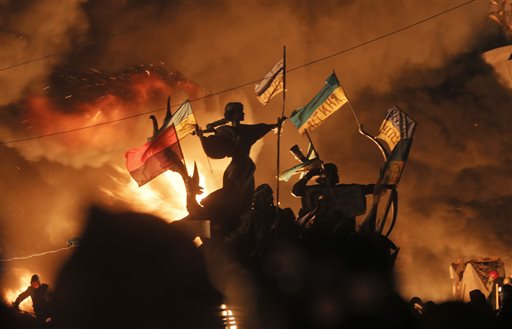On Wednesday, the White House announced that it would be taking a muscular new role in Ukraine: by deferring to the Russians. Again.
As the streets burn in Ukraine, and with police cracking down on opposition protesters, Vice President Joe Biden, who has been handed the unpleasant Ukrainian situation to handle, called up Ukrainian President Viktor Yanukovich to express “grave concern” over the situation. He also told Yanukovich that the “United States condemns violence by any side, but that the government bears special responsibility to de-escalate the situation.” Jay Carney reiterated that message at the White House, stating, “We continue to condemn street violence and excessive use of force by either side. Force will not resolve the crisis.”
Then the White House went further on Wednesday: White House Deputy National Security Adviser Ben Rhodes explained, according to Reuters, that “the United States would like to see Russia support efforts to reduce tensions in Ukraine.”
Demonstrating precisely the sort of responsible attitude that has led the Obama administration to hand over America’s leading role with regard to Syria and Iran, the Russian government has responded by blaming the United States for the Ukrainian violence. Russian Foreign Ministry official Aleksandr Lukashevich has said that the US is attempting to craft a “Western vector of development” on Ukraine, and accused the Obama administration of “puppeteering” in the country.
America’s retreat from the global stage has meant more violence, not less; it has meant more power for America’s enemies, not less. Instead of an overall policy promoting American interests, the Obama administration has opted for the Little Jack Horner Doctrine: we stick our thumbs in the pie, and hope to pull out a plum. In the process, we spoil the pie.
America wants it both ways. On the one hand, we want Russia involved, because we are too weak to back anyone in the Ukrainian fight. Thanks to that non-participation, we have refused to offer incentives to current Ukrainian President Viktor Yanukovich to abandon his Russian connections; in fact, former Secretary of State Hillary Clinton repeatedly expressed sympathy for the Ukrainian opposition, even though members of that opposition are both connected to Russia and to open anti-Semites. That drove the Ukrainian administration deeper into the arms of Vladimir Putin.
That’s all well and good, except that the United States apparently also wants to micromanage the opposition. Just weeks ago, Russia revealed tape of the State Department’s Victoria Nuland telling US ambassador to Ukraine Geoffrey Pyatt that the US perspective should be to “f*** the EU.” She was making the case that Vitali Klitschko, current opposition leader, former boxing champion, and European Union ally, should not enter the Ukrainian government: “I don’t think that Klitcschko should go into the government. I don’t think it is necessary. I don’t think it is a good idea….I think to help glue this thing and have the UN glue it and you know, f*** the EU.” Pyatt replied, “We’ve got to do something to make it stick together, because you can be pretty sure that if it does start to gain altitude the Russians will be working behind the scenes to try to torpedo it.”
If this sounds like incoherent policy, that’s because it is. The truth is that the major politicians in Ukraine always flirt with the Russian bear, because the Russians are next door and have resources at easy access. And it’s also true that both sides are filled with corrupt kleptocrats, as the country has found out over the last twenty years.
After the fall of the Soviet Union, Ukraine declared itself independent; former Communist Party member Leonid Kravchuk took power. He moved toward the West, but corruption began worming its way through the government. That prompted the election of Leonid Kuchma, who wanted further integration with Russia. Over time, he drew closer to the European Union, but moved toward Russia again as his administration was hit by corruption scandals. The attempt to shoehorn his successor, Yanukovich, into the presidency, prompted the Orange Revolution. That ushered in the era of Viktor Yushchenko, leading a coalition of nationalists, communists, and socialists. He proceeded to move toward the European Union, but again was enmeshed in corruption, along with his former ally Yulia Tymoshenko – and Yanukovich was suddenly elevated back into power. Which prompted a new move toward Russia, and this current set of protests.
So what would a good US policy look like? It would oppose the encroachment of the Russian bear. It would involve wooing Ukraine, and backing anti-corruption candidates – Klitschko’s entire party is premised on anti-corruption and pro-Westernism – instead of deferring to the Kremlin. If the United States is unwilling to side with any particular politician, the United States certainly should be working to offer incentives against Moscow’s continued involvement in Ukraine. Instead, America wavers in the battle between liberty and corruption. The predictable outcome: more dead innocents, more chaos, and a more dangerous world.
Ben Shapiro is Senior Editor-At-Large of Breitbart News and author of the New York Times bestseller “Bullies: How the Left’s Culture of Fear and Intimidation Silences America” (Threshold Editions, January 8, 2013). He is also Editor-in-Chief of TruthRevolt.org. Follow Ben Shapiro on Twitter @benshapiro.

COMMENTS
Please let us know if you're having issues with commenting.